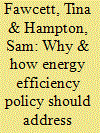| Srl | Item |
| 1 |
ID:
099285


|
|
|
|
|
| Publication |
2010.
|
| Summary/Abstract |
In 2008, the UK government undertook a review of personal carbon trading (PCT) and declared that it was 'an idea currently ahead of its time'. PCT is a radical policy proposal which would entail all adults receiving an equal, tradable carbon allowance to cover emissions from household energy and/or personal travel. The allowance would reduce over time, in line with national emissions reduction goals. The government's key concerns about PCT were its social unacceptability and high cost. This paper reviews the literature and identifies knowledge gaps, and then discusses whether these concerns are justified. Contrary to the government's conclusions, most research shows PCT to be at least as socially acceptable as an alternative taxation policy. People think it could be both fair and effective. Set-up and running costs for PCT will undoubtedly be higher than for alternative taxation policies. However, PCT could deliver benefits from individual and social change motivated by non-economic aspects of the policy. These potential benefits are outlined here. The conclusion is that PCT is a promising and timely policy idea.
|
|
|
|
|
|
|
|
|
|
|
|
|
|
|
|
| 2 |
ID:
176737


|
|
|
|
|
| Summary/Abstract |
The 2018 IPCC report states that all sectors of the economy, and actors at all scales from individuals to governments, must take urgent action to reduce greenhouse gas emissions. Small and medium enterprises (SMEs) are important actors whose use of energy, and potential for energy and carbon savings, are largely overlooked by current efficiency policy in the UK and EU. Using theory, empirical evidence and policy analysis, this paper sets out the case for increased policy focus on SMEs, and proposes ways forward. SMEs account for more than half of industrial and commercial energy use, however, the details of their energy use and the potential for savings is poorly understood. While energy end-uses are similar to those in larger enterprises, SMEs’ capacity for paying attention to energy and responding to policy are different, as are their decision-making processes. Designing and delivering effective policy for this heterogenous group will require strategic segmentation and targeted interventions, in turn demanding improved data. We set out a research agenda to address deficiencies in data and evidence, and propose a series of options for policy makers.
|
|
|
|
|
|
|
|
|
|
|
|
|
|
|
|